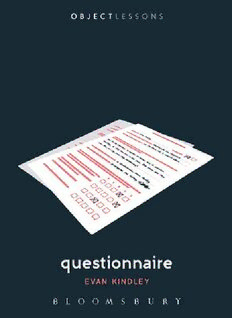
Questionnaire PDF
Preview Questionnaire
“ The Object Lessons series achieves something very close to magic: the books take ordinary—even banal—objects and animate them with a rich history of invention, political struggle, science, and popular mythology. Filled with fascinating details and conveyed in sharp, accessible prose, the books make the everyday world come to life. Be warned: once you’ve read a few of these, you’ll start walking around your house, picking up random objects, and musing aloud: ‘I wonder what the story is behind this thing?’ ” Steven Johnson, author of Where Good Ideas Come From and How We Got to Now “ In 1957 the French critic and semiotician Roland Barthes published Mythologies, a groundbreaking series of essays in which he analysed the popular culture of his day, from laundry detergent to the face of Greta Garbo, professional wrestling to the Citroën DS. This series of short books, Object Lessons, continues the tradition.” Melissa Harrison, Financial Times “ Though short, at roughly 25,000 words apiece, these books are anything but slight.” Marina Benjamin, New Statesman “ The joy of the series, of reading Remote Control, Golf Ball, Driver’s License, Drone, Silence, Glass, Refrigerator, Hotel, and Waste (more titles are listed as forthcoming) in quick succession, lies in encountering the various turns through which each of their authors has been put by his or her object. As for Benjamin, so for the authors of the series, the object predominates, sits squarely center stage, directs the action. The object decides the genre, the chronology, and the limits of the study. Accordingly, the author has to take her cue from the thing she chose or that chose her. The result is a wonderfully uneven series of books, each one a thing unto itself.” Julian Yates, Los Angeles Review of Books “ The Object Lessons project, edited by game theory legend Ian Bogost and cultural studies academic Christopher Schaberg, commissions short essays and small, beautiful books about everyday objects from shipping containers to toast. The Atlantic hosts a collection of “mini object-lessons”… More substantive is Bloomsbury’s collection of small, gorgeously designed books that delve into their subjects in much more depth.” Cory Doctorow, Boing Boing A book series about the hidden lives of ordinary things. Series Editors: Ian Bogost and Christopher Schaberg Advisory Board: Sara Ahmed, Jane Bennett, Jeffrey Jerome Cohen, Johanna Drucker, Raiford Guins, Graham Harman, renée hoogland, Pam Houston, Eileen Joy, Douglas Kahn, Daniel Miller, Esther Milne, Timothy Morton, Kathleen Stewart, Nigel Thrift, Rob Walker, Michele White. In association with Books in the series Remote Control by Caetlin Benson-Allott Golf Ball by Harry Brown Driver’s License by Meredith Castile Drone by Adam Rothstein Silence by John Biguenet Glass by John Garrison Phone Booth by Ariana Kelly Refrigerator by Jonathan Rees Waste by Brian Thill Hotel by Joanna Walsh Hood by Alison Kinney Dust by Michael Marder Shipping Container by Craig Martin Cigarette Lighter by Jack Pendarvis Bookshelf by Lydia Pyne Password by Martin Paul Eve Questionnaire by Evan Kindley Hair by Scott Lowe Bread by Scott Cutler Shershow Sock by Kim Adrian (forthcoming) Tree by Matthew Battles (forthcoming) Earth by Jeffrey Jerome Cohen and Linda T. Elkins-Tanton (forthcoming) Eye Chart by William Germano (forthcoming) Doorknob by Thomas Mical (forthcoming) Shopping Mall by Matthew Newton (forthcoming) Blanket by Kara Thompson (forthcoming) questionnaire evan kindley Bloomsbury Academic An imprint of Bloomsbury Publishing Inc NEW YORK • LONDON • OXFORD • NEW DELHI • SYDNEY Bloomsbury Academic An imprint of Bloomsbury Publishing Inc 1385 Broadway 50 Bedford Square New York London NY 10018 WC1B 3DP USA UK www.bloomsbury.com BLOOMSBURY and the Diana logo are trademarks of Bloomsbury Publishing Plc First published 2016 © Evan Kindley, 2016 All rights reserved. No part of this publication may be reproduced or transmitted in any form or by any means, electronic or mechanical, including photocopying, recording, or any information storage or retrieval system, without prior permission in writing from the publishers. No responsibility for loss caused to any individual or organization acting on or refraining from action as a result of the material in this publication can be accepted by Bloomsbury or the author. Library of Congress Cataloging-in-Publication Data Names: Kindley, Evan, author. Title: Questionnaire / Evan Kindley. Description: New York : Bloomsbury Academic, [2016] | Series: Object lessons | Includes bibliographical references and index. Identifiers: LCCN 2015050479 (print) | LCCN 2016008073 (ebook) | ISBN 9781501314773 (paperback) | ISBN 9781501314797 (ePub) | ISBN 9781501314780 (ePDF) Subjects: LCSH: Questionnaires—History. | Questionnaires—Methodology. | Social surveys—History. | BISAC: LITERARY CRITICISM / Semiotics & Theory. | PHILOSOPHY / Aesthetics. | SOCIAL SCIENCE / Media Studies. Classification: LCC HM537 .K56 2016 (print) | LCC HM537 (ebook) | DDC 300.72/3—dc23 LC record available at http://lccn.loc.gov/2015050479 ISBN: PB: 978-1-5013-1477-3 ePub: 978-1-5013-1479-7 ePDF: 978-1-5013-1478-0 Series: Object Lessons Cover design: Alice Marwick Cover image © Alice Marwick Typeset by Deanta Global Publishing Services, Chennai, India To Emily, for everything, but especially _______________ I am beginning to wonder Whether this alternative to Sitting back and doing something quiet Is the clever initiative it seemed. —John Ashbery, “Proust’s Questionnaire” Contents Introduction: The form as form 1 1 Private publicity 9 2 Testing, testing 25 3 Your opinion of you 41 4 The art of asking 53 5 Pandora’s checklist 71 6 Dating and data 87 7 Quiz mania 103 Acknowledgments 127 Notes 129 Index 141
